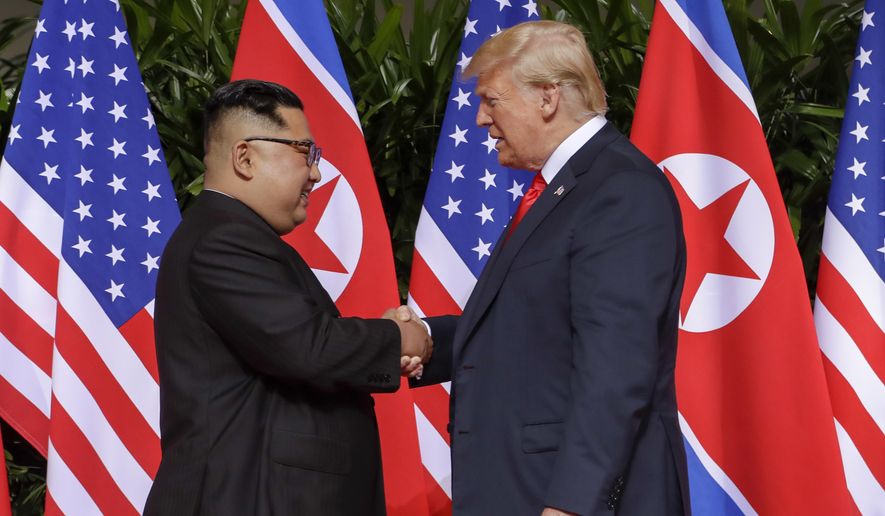OPINION:
A meeting between Kim Jong-un and President Trump in Singapore in June is presented by the White House as something of a triumph by the president for defusing the possibility of conflict on the Korean peninsula.
Defusing conflict, particularly in the nuclear age, is always a good idea. But is another meeting between Mr. Kim and the president really the way to do it?
The long history of negotiations with Communist leaders is drearily familiar, lengthy and laborious discussions with much delayed outcomes, if successful at all. The North Korean dictator has scored heavily thus far.
By seducing Washington into direct negotiations — something the United States has studiously avoided for years — Mr. Kim has lifted his country from a bankrupt Communist satellite state totally dependent on Chinese and Russian aid — and presumably policy guidance — to one of international power as an aspiring equal to the world’s No. 1.
Only a few months ago, it was obvious North Korea faced a desperate situation. The U.S. blockade, which some of the allies (and even in a way) the United Nations were observing, had further crippled the fragile North Korean economy, a quarter of which is dedicated to its military of almost a million men 5,500,000 more reserves in a population of 26 million. South Korea, with double that population, maintains a standing army of 600,000 with a reserve of 3,100,000. There are, of course, some 25,000 U.S. military permanently based in South Korea.
The Pyongyang government was able to skirt the sanctions to some extent through worldwide black market operations dealing with pariah nations such as Iran. But it was China, itself facing a declining growth rate and increasing economic woes, which faced dealing with the increasingly heavy economic burden of North Korea.
Japanese military and diplomatic gossip says that a catastrophic accident has severely damaged North Korea’s nuclear missile ambitions. Not only were essential parts of the weapons infrastructure killed, but a number of essential North Korean nuclear-missile technocrats died as well. This, the speculation goes, was the reason for the recent absence of North Korean missile testing, and not the eagerness to meet the United States again to negotiate a further reduction of tension and to bask in peace.
Whether the Japanese gossip is correct can’t be easily learned, but what is known is that there is scant logic in North Korea’s push for more negotiations with the United States just now. If the North Koreans are sincere in negotiating with the United States to reduce their nuclear and missile programs, they would inevitably have to disassemble a cruel and oppressive regime.
Pyongyang has shown some signs of changing attitudes, but it has made no further major concessions beyond abandoning certain tests and missile launches over Japan. In fact, says a report by the U.N. nuclear watchdog organization, North Korea is continuing to work on its nuclear weapons program, raising questions over the regime’s commitment to denuclearization. It’s the destruction of the North’s nuclear warfare capabilities that is the aim of American policymakers.
In one of the most specific reports on Pyongyang’s nuclear activities, the International Atomic Energy Agency cites the enrichment of uranium and construction at the country’s main nuclear site.
“The continuation and further development of [North Korea’s] nuclear program and related statements by the [regime] are a cause for grave concern,” the agency said. Indeed, nearly everything about North Korea is a cause for grave concern. American policy-makers, and President Trump, must keep that firmly in mind. Another Trump-Kim photo-op would be more than a waste of time, in Singapore or anywhere else.




Please read our comment policy before commenting.